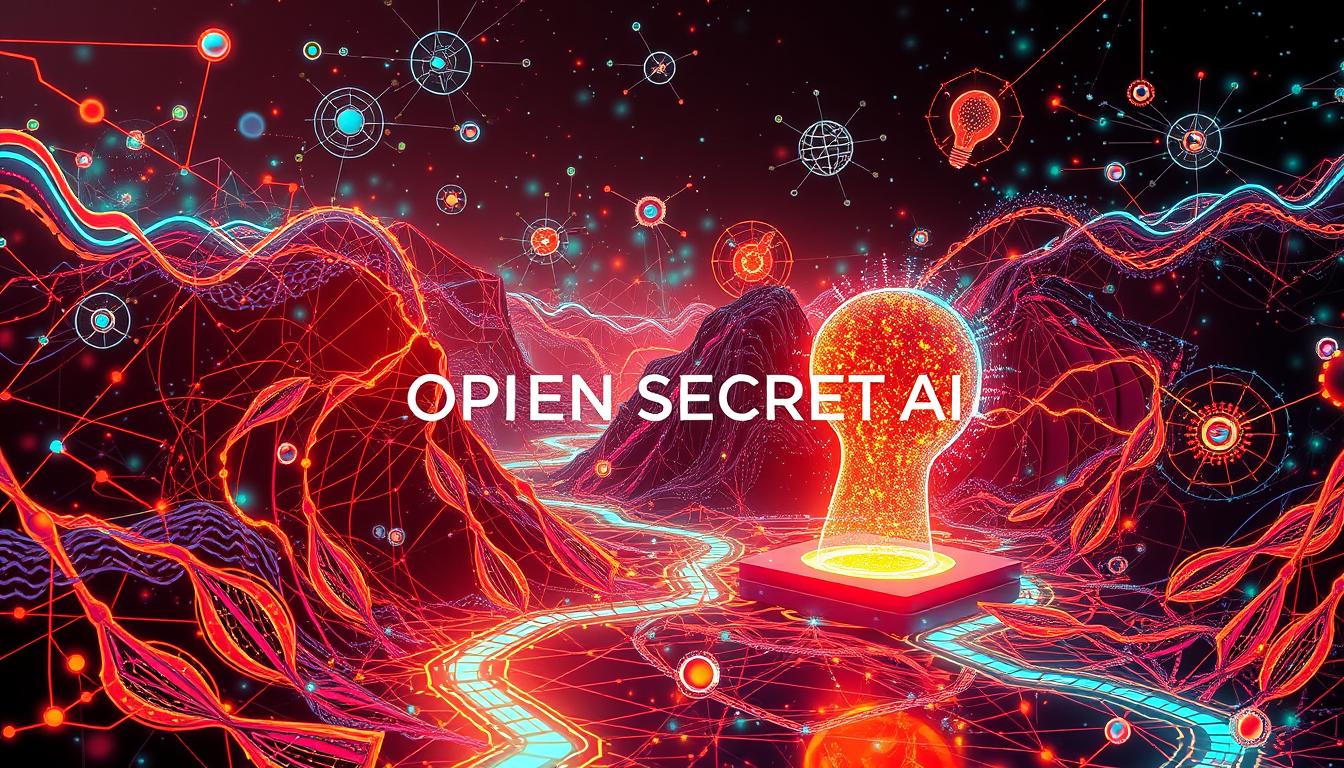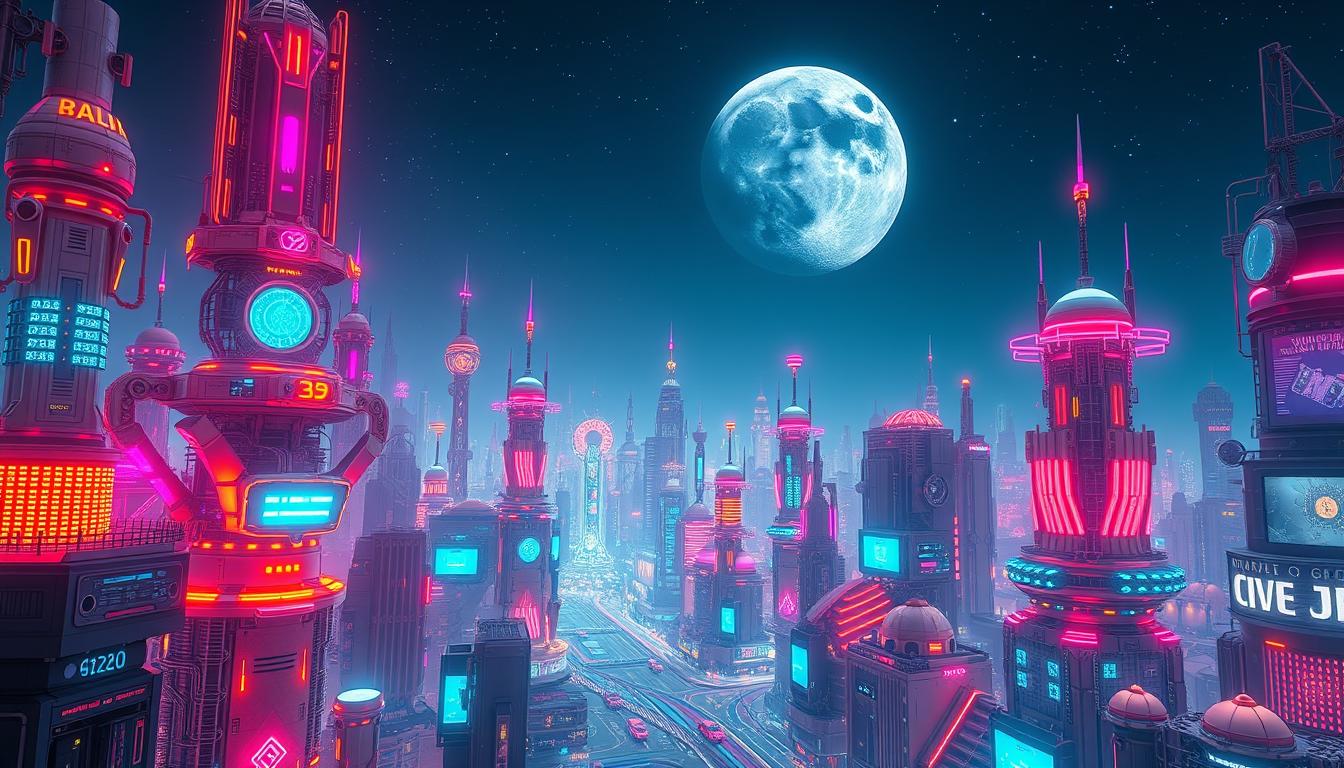In today’s tech-driven world, a new player is changing the game – Generative Artificial Intelligence (GenAI). This cutting-edge tech has caught the eye of tech lovers everywhere. It’s also making waves in industries all over the globe. But, have you ever thought, what makes GenAI so powerful, and how is it changing how we think, create, and run businesses?
Key Takeaways
- ChatGPT, a GenAI tool, reached 100 million users in just 60 days, surpassing the growth of social media giants like TikTok and Instagram.
- The GenAI development market is currently valued at $36 billion and is expected to grow to a staggering $1.3 trillion by 2032.
- GenAI is experiencing a compound annual growth rate (CAGR) of over 40%, outpacing the growth of the internet and smartphones.
- The adoption of GenAI is estimated to trigger a $280-300 billion surge in sales of software, apps, and tools.
- GenAI is transforming industries such as manufacturing, media, marketing, customer service, and healthcare, leading to increased productivity, cost savings, and efficiency improvements.
Understanding the GenAI Revolution
Generative Artificial Intelligence (GenAI) is changing the game. It’s seen as a major leap forward, even bigger than the internet. GenAI uses artificial neural networks to create new language models and machine learning tools.
The Birth of a New Technology Era
Tools like ChatGPT and DALL-E 2 are making waves. They can write like humans, create amazing images, and even code. This technology is set to boost software sales by $280-300 billion as companies start using it.
Core Components of GenAI Systems
- Large Language Models (LLMs): These networks are trained on huge datasets. They can write text that sounds like it was written by a human.
- Retrieval Augmented Generation (RAG): This method uses LLMs to find and use information from outside sources. It makes the output more accurate and relevant.
- Prompt Engineering: Crafting the right prompts is key. It helps GenAI systems respond in creative and analytical ways.
The Impact on Global Markets
GenAI is changing how businesses work. It’s making operations smoother, improving customer service, and driving new ideas. McKinsey says that without AI, tech, media, and telecom will soon be outdated.
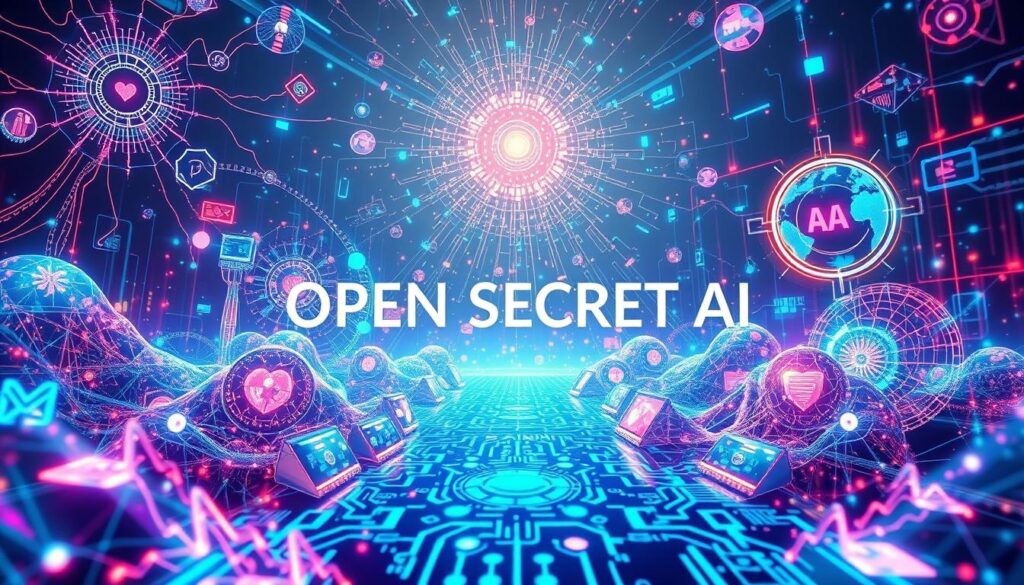
The Billion-Dollar Growth Story of GenAI
The GenAI market is set to explode, growing from $36 billion to $1.3 trillion by 2032. This growth rate of 40% per year is faster than the internet and smartphones. Businesses will spend more on software and tools, adding $280-300 billion in revenue.
Leaders and investors are taking notice of GenAI’s fast progress. OpenAI’s ChatGPT was a top choice until 2023. Now, models like Meta’s Llama, Mistral, and TII’s Falcon are changing the game. They offer affordable and efficient AI solutions, boosting AI market growth and GenAI investments.
The rise in technology adoption is also pushing other areas forward. Storage and data management are seeing huge growth. The need for better storage and data tools is skyrocketing.
| Metric | Projected Growth |
|---|---|
| AI Market Size | $780 billion to $990 billion by 2027 |
| AI Workloads | 25% to 35% growth per year through 2027 |
| Data Center Scale | From 100 megawatts to gigawatts |
The GenAI revolution is changing industries and attracting big investments. Startups like Physical Intelligence and Skild have raised hundreds of millions. The future of GenAI looks bright, full of innovation and growth.
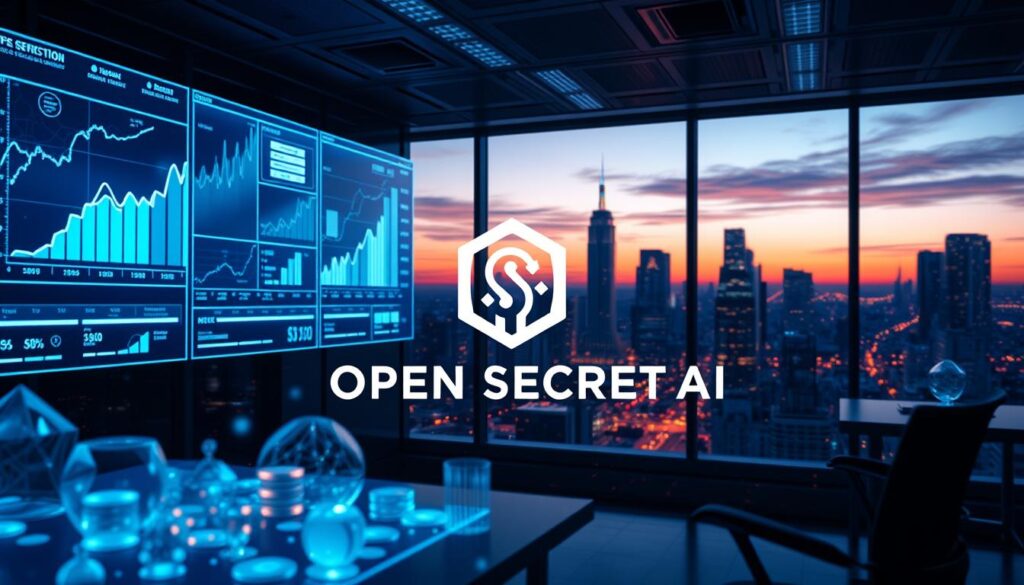
Generative Artificial Intelligence: Core Capabilities and Applications
Generative Artificial Intelligence (GenAI) is changing how businesses work. It offers powerful tools for growth and innovation. Three main applications are making big changes in industries worldwide.
Content Generation and Creation
GenAI can make high-quality content like images, videos, and text. It uses natural language processing and deep learning to do this fast and well. This saves time and money for companies.
Now, businesses can make content that fits each customer’s needs. This makes their messages more personal and engaging.
Data Analysis and Pattern Recognition
GenAI is great at looking through lots of data. It finds patterns and insights that humans might miss. This is thanks to unsupervised learning.
It helps businesses make better choices and innovate. This is because GenAI can spot trends and anomalies in data.
Predictive Modeling and Simulation
GenAI can predict and improve complex processes. It tests different plans to find the best one. This helps companies work better, save money, and stay ahead in the market.
GenAI is getting better and more popular. It’s changing how businesses create content, analyze data, and improve processes. This technology is opening up new chances for growth and leading to the next big industry leaders.
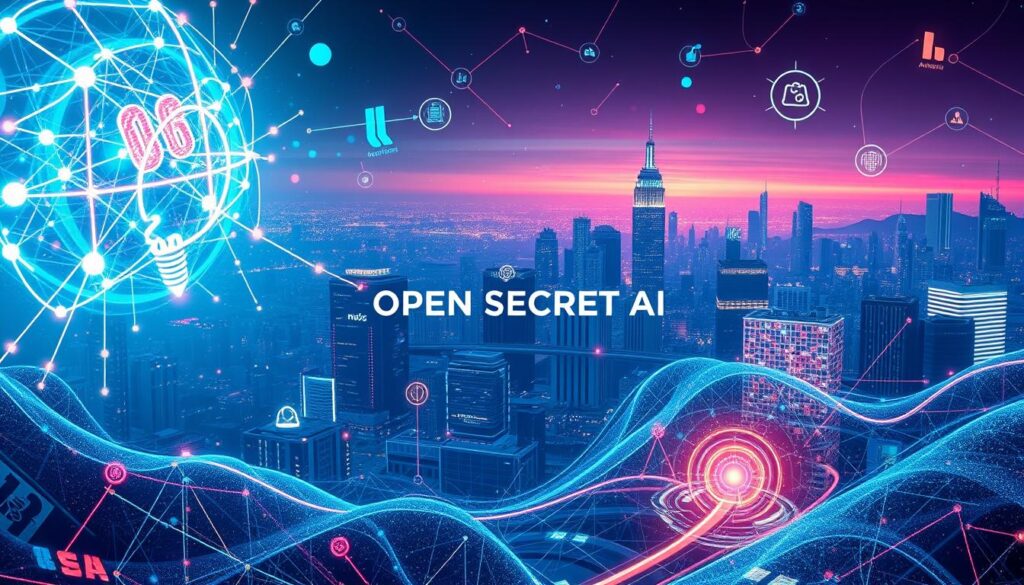
Revolutionary Tools Reshaping Business Operations
Generative Artificial Intelligence (GenAI) is changing how businesses work. It brings new levels of efficiency and productivity. These AI tools are making things possible that were once dreams.
Unchecked Fitness is a top health and wellness app. It uses GenAI to create diet and workout plans for each user. This makes the app better for users and helps the business grow.
Bosch is using GenAI to improve quality control in manufacturing. It checks over 15,000 AI images to find problems before they start. This cuts down on waste and makes things run smoother.
| Industry | GenAI Application | Outcome |
|---|---|---|
| Fitness | Personalized diet and workout plans | Enhanced customer experience, increased productivity |
| Manufacturing | AI-powered quality control and damage detection | Reduced waste, streamlined operations |
| Media | Automated transcription, translation, and scene listing | Improved content creation efficiency |
Thomson Reuters is using GenAI in the media world. They’ve made a tool that does automatic transcription, translation, and scene listing. This makes making content much faster and better.
AI tools are changing how businesses work in many fields. They help businesses grow and work better. Companies that use GenAI are getting ahead in the digital world.
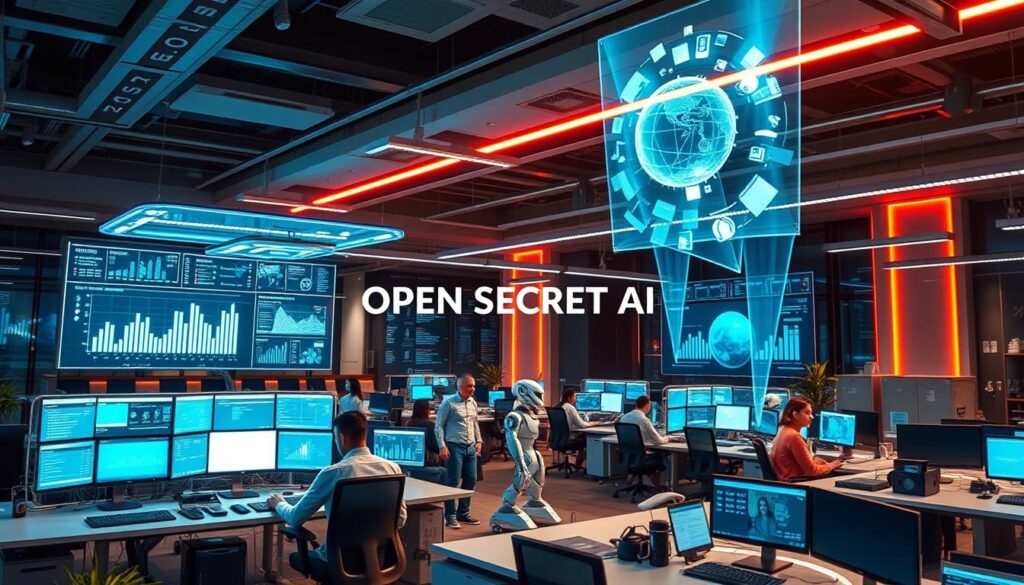
Healthcare Innovation Through GenAI
Generative artificial intelligence (GenAI) is changing healthcare fast. It’s making new ways to find drugs, create treatment plans, and diagnose with images. This tech could make healthcare better and more efficient for everyone.
Drug Discovery and Development
GenAI is speeding up drug research and testing. It lets scientists study molecules and biological interactions quickly and accurately. A company called Insilico Medicine used GenAI to make a new medicine, INS018_055, in 70% less time.
This medicine went into Phase 2 clinical trials in months, not years. It’s cheaper and helps patients get better faster.
Personalized Treatment Plans
GenAI is also changing personalized medicine. It looks at lots of patient data to make treatment plans just for each person. This makes healthcare more tailored and effective.
It’s changing how we diagnose, treat, and watch over patients. This leads to better health outcomes and a more personal experience for patients.
Medical Imaging and Diagnostics
GenAI is also changing medical imaging and diagnostics. It helps doctors analyze data and images faster and more accurately. This makes disease detection better and screening more efficient.
It could reduce healthcare system burdens and improve patient care. This is a big step forward for healthcare.
As GenAI use grows, healthcare will see a new era of innovation. This tech will be key in shaping the future of patient care and changing how healthcare is delivered.
| Statistic | Value |
|---|---|
| Global market for healthcare GenAI | $1.5 billion in 2023, projected to reach $5 billion by 2028 |
| Healthcare organizations actively engaged in GenAI | 10% in the US, with an additional 14% just starting their journey |
| Healthcare organizations implementing or testing GenAI | Over 70% |
| Healthcare organizations experiencing positive ROI from GenAI | 60% |
| GenAI budget increase for some healthcare organizations | 300% |
| Healthcare organizations preferring custom-built, task-specific language models | 36% |
These numbers show how much AI in healthcare is growing. They show the industry’s focus on medical innovation and drug discovery with GenAI.
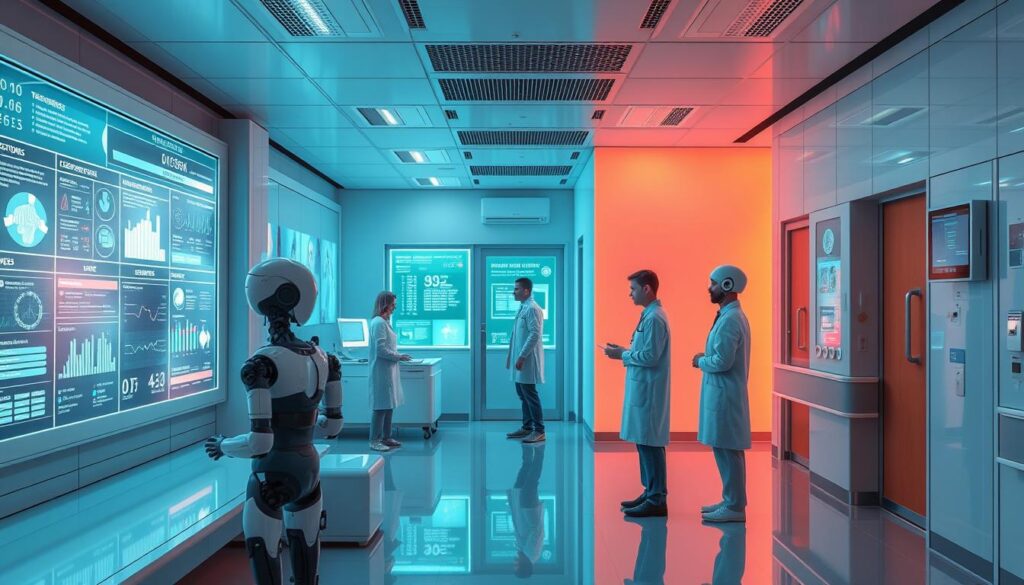
“Generative AI is proving beneficial in areas like automating documentation, personalizing patient communications, creating synthetic patient cases, and enriching data sharing.”
Manufacturing Excellence with GenAI Solutions
The manufacturing world is embracing Generative Artificial Intelligence (GenAI) to boost productivity and efficiency. With the global GenAI market expected to grow by 24.40%, it’s set to hit $207 billion by 2030. This growth is opening doors for manufacturers to transform their operations.
GenAI is changing the game in manufacturing by improving supply chains, designing better products, and personalizing customer experiences. Big names like General Electric, Baxter International, Ford, and Georgia-Pacific are already seeing the benefits of this new tech.
GenAI makes prototyping faster, leading to quicker design changes. It also helps reduce downtime through AI-driven maintenance, making operations more efficient. Ford is saving costs and improving its supply chain thanks to GenAI.
GenAI also helps spot defects in real-time, improving product quality and cutting down on waste. It lets product engineers focus on design goals without the usual research. This way, they can explore different design options and test them precisely for the best results.
| Application | Benefits |
|---|---|
| Supply Chain Optimization | Cost savings, enhanced operational effectiveness |
| Real-time Defect Detection | Improved product quality, reduced waste |
| Rapid Prototyping | Quicker design iterations, accelerated innovation |
| AI-driven Maintenance | Reduced downtime, enhanced operational efficiency |
While GenAI in manufacturing has its challenges, like needing good data and overcoming employee resistance, the industry is working hard to solve these issues. With the Generative AI in Manufacturing Market expected to hit USD 6,398.8 Mn by 2032, the future looks bright for GenAI solutions in manufacturing.
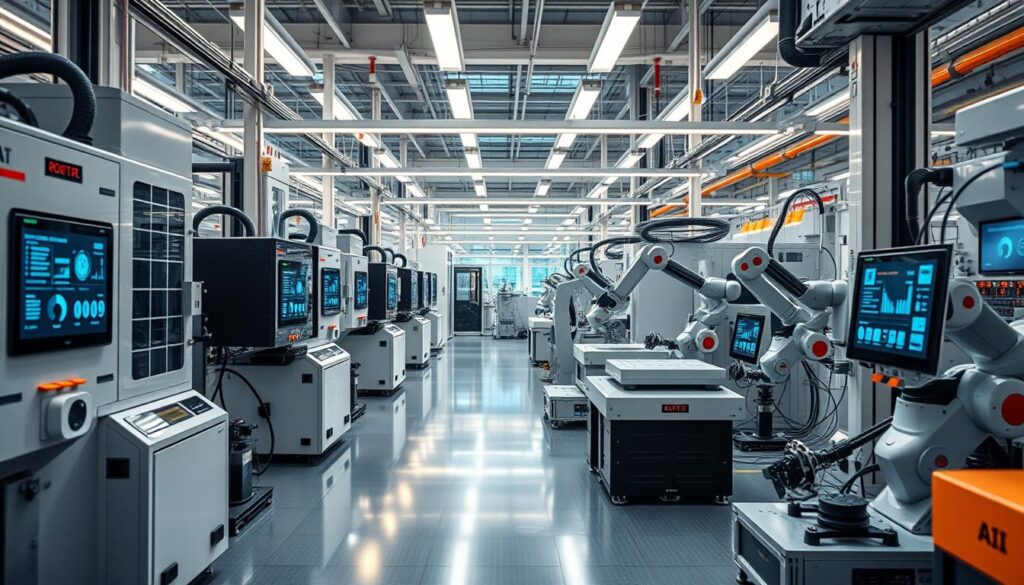
Content Creation and Media Revolution
Generative Artificial Intelligence (GenAI) is changing the media and content creation worlds. It opens up new creative possibilities and makes text, images, and videos instantly. GenAI is also changing how we see and interact with digital content, making it more personalized.
Automated Content Generation
GenAI tools are making content creation faster by automating tasks. For example, Thomson Reuters has a GenAI video tool. It automatically makes transcripts, translations, and scene lists, making videos more accessible.
Journalists can now find specific terms in videos quickly. This makes getting information faster and easier.
Visual and Audio Production
GenAI is also improving visual and audio production. It can create realistic images and animations and even synthetic voices. This lets creators bring their ideas to life quickly and flexibly.
This is great for marketing, where making content that speaks to each person is key. It helps in creating engaging multimedia experiences.
Personalized Media Experiences
GenAI is also changing how we watch media by making it more personal. AI-driven recommendations and content curation are becoming common. This means everyone gets content that fits their likes and interests.
This personal touch is making people more engaged and loyal to media and entertainment platforms. It’s a big win for businesses and customers alike.
As GenAI becomes more popular, the media and content creation fields are set for a big change. Businesses can become more efficient, creative, and engaging. This will lead to a more personalized and immersive digital world.
| Metric | Value | Projection |
|---|---|---|
| Global AI market | $214.6 billion (2024) | $1,339.1 billion by 2030 (CAGR of 35.7%) |
| AI market for media and entertainment | $15.11 billion (2023) | $121.99 billion by 2032 (CAGR of 26.12%) |
| AI voice generators market | $3 billion (2024) | $20.4 billion by 2030 (CAGR of 37.1%) |
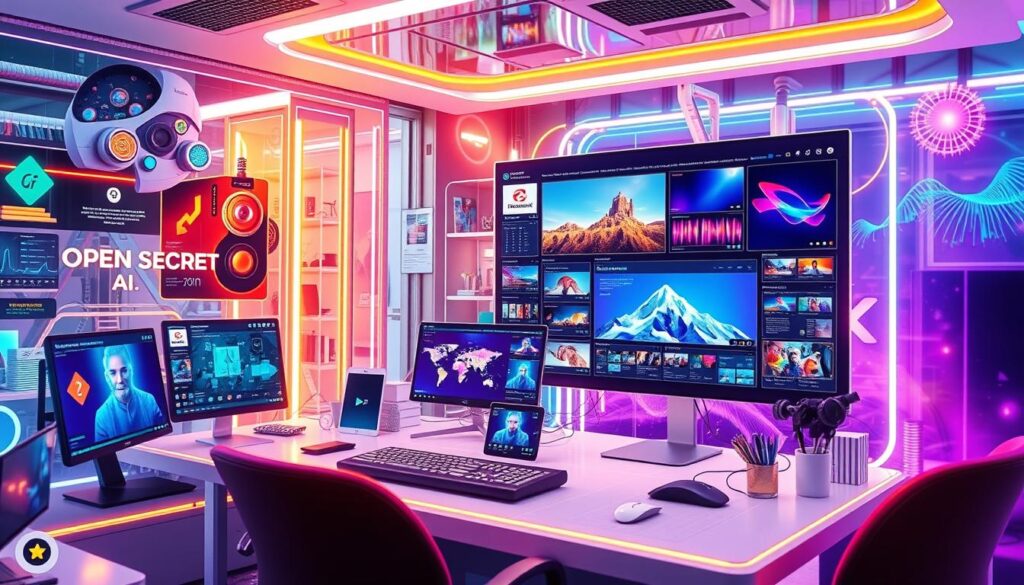
“Over 75% of consumers are concerned about false information coming from artificial intelligence.”
Ethical Considerations and Challenges
Generative artificial intelligence (AI) is changing many industries. But it also raises big ethical questions. One major issue is who owns AI-generated content, which is made from human works.
There’s also debate about whether AI art is as valuable as art made by humans. Some worry that AI could take jobs, but experts say it will also create new ones. We need to find a balance between using AI and keeping human touch in our work.
Another challenge is dealing with sophisticated AI scams. These scams can trick people in ways that old scams can’t. We must be careful and stay alert.
There are also worries about data privacy. AI systems can sometimes reveal personal info or data. This is a big concern. Another issue is biased content because AI can reflect the biases in its training data.
To make AI work for everyone, we need to follow ethical AI rules. We must be open, accountable, and careful in how we use AI. This way, we can enjoy its benefits while protecting everyone’s rights.
| Ethical Concern | Description |
|---|---|
| Intellectual Property | Debates around the ownership of AI-generated content and its impact on existing copyright laws. |
| Data Privacy | Risks of sensitive information disclosure and violations of personal data protection regulations. |
| AI Bias | Potential for generative AI to amplify societal biases present in training data and model design. |
| Job Displacement | Concerns about the impact of automation on traditional jobs, balanced by the creation of new roles. |
| Accountability | The need for transparency and responsible development of generative AI systems. |
As AI ethics keeps changing, we need to work together. This includes industry, policymakers, and civil society. Together, we can make sure AI is used in a way that’s good for everyone.
Future Prospects and Industry Adoption
Generative Artificial Intelligence (GenAI) is growing fast, promising a lot for the future. It’s making it harder to tell if something was made by a human or AI. This change is bringing humans and AI together in new ways.
GenAI is set to change many industries, bringing new chances for growth and creativity. Goldman Sachs says GenAI could make about 26% of tasks in creative fields easier to do. This could make work more efficient and help people do their jobs better.
Emerging Trends
GenAI is becoming a bigger part of creative work, mixing human and AI ideas. This mix is expected to change many fields, opening up new chances for growth and creativity.
- Automation of simple tasks could free up time for more important work
- It could make jobs more satisfying and workers more productive
- It could also help less experienced workers do better at their jobs
Implementation Strategies
As GenAI becomes more common, companies need to plan carefully to use it well. They must think about ethics and possible problems.
- They should create clear rules for using AI, to avoid unfairness
- They should help workers learn new skills for the changing job market
- They should work with governments and experts to make sure AI is used right
Market Predictions
Experts think AI will grow a lot, changing many areas. But, how it will affect jobs is a big debate.
| Statistic | Insight |
|---|---|
| More than 30% of all workers could see at least 50% of their occupation’s tasks disrupted by generative AI. | Generative AI has the power to change many jobs, so companies need to plan ahead. |
| Most Americans believe that generative AI will have a major impact on jobs, mainly negative, in the next two decades. | People are worried about AI’s effect on jobs, so companies need to talk about it and find ways to help. |
As GenAI becomes more common, industries and governments need to work together. This way, they can use AI’s power to grow, innovate, and work better.
Conclusion
Generative AI is more than just a tool for making things easier. It’s a key driver of change in many fields. It lets creators spend more time on big ideas and making a real AI impact and industry transformation.
The mix of human creativity and AI is changing whole industries. It opens up new chances for growth and the future of generative AI.
As Generative AI gets better, it will change how we think about creativity and solving problems. It makes things like content, data analysis, and simulations much better. This is changing what’s possible in fields like healthcare and entertainment.
Even though there are challenges and things to think about, the benefits of Generative AI are clear. It can help businesses and people succeed in new ways. The future is full of possibilities.
FAQ
What is Generative Artificial Intelligence (GenAI)?
GenAI is a new tech that uses big language models and data to make text, images, audio, and video. It learns from old and new data to create new stuff. This is changing many industries worldwide.
How fast is the GenAI market growing?
The GenAI market is growing fast, from billion to
FAQ
What is Generative Artificial Intelligence (GenAI)?
GenAI is a new tech that uses big language models and data to make text, images, audio, and video. It learns from old and new data to create new stuff. This is changing many industries worldwide.
How fast is the GenAI market growing?
The GenAI market is growing fast, from $36 billion to $1.3 trillion by 2032. It’s growing at a 40% CAGR, which is quicker than the internet and smartphones. This shows how quickly GenAI is being adopted and changing things.
What are the core capabilities of GenAI for businesses?
GenAI helps businesses in four main ways. It can quickly make content, personalize things, act as virtual assistants, and improve processes. It makes high-quality content, offers personalized experiences, and helps with complex tasks to find better strategies.
How are businesses using GenAI tools to transform their operations?
Companies in many fields are using GenAI to work better and faster. For example, Unchecked Fitness makes custom diet and workout plans. Bosch finds problems in manufacturing early. Thomson Reuters uses GenAI to make videos faster.
What is the impact of GenAI on the healthcare industry?
GenAI is speeding up drug discovery and testing in healthcare. It looks at molecular structures and biological interactions to make drugs safer and more effective. Insilico Medicine used GenAI to make a new medicine in 70% less time, going to clinical trials in months.
What are the ethical concerns and challenges associated with GenAI?
GenAI raises big questions about ownership, copyright, and what’s real. There’s debate over who owns AI-made content. People also wonder if AI art is as valuable as human art. There’s worry about jobs, but experts think AI will create new ones.
What is the future of GenAI?
GenAI’s future is exciting, with more use in creative work. The line between human and AI-made content will blur. Humans and AI working together will change industries, bringing new chances for growth and innovation. As GenAI gets better, it will change how we think, solve problems, and run businesses.
.3 trillion by 2032. It’s growing at a 40% CAGR, which is quicker than the internet and smartphones. This shows how quickly GenAI is being adopted and changing things.
What are the core capabilities of GenAI for businesses?
GenAI helps businesses in four main ways. It can quickly make content, personalize things, act as virtual assistants, and improve processes. It makes high-quality content, offers personalized experiences, and helps with complex tasks to find better strategies.
How are businesses using GenAI tools to transform their operations?
Companies in many fields are using GenAI to work better and faster. For example, Unchecked Fitness makes custom diet and workout plans. Bosch finds problems in manufacturing early. Thomson Reuters uses GenAI to make videos faster.
What is the impact of GenAI on the healthcare industry?
GenAI is speeding up drug discovery and testing in healthcare. It looks at molecular structures and biological interactions to make drugs safer and more effective. Insilico Medicine used GenAI to make a new medicine in 70% less time, going to clinical trials in months.
What are the ethical concerns and challenges associated with GenAI?
GenAI raises big questions about ownership, copyright, and what’s real. There’s debate over who owns AI-made content. People also wonder if AI art is as valuable as human art. There’s worry about jobs, but experts think AI will create new ones.
What is the future of GenAI?
GenAI’s future is exciting, with more use in creative work. The line between human and AI-made content will blur. Humans and AI working together will change industries, bringing new chances for growth and innovation. As GenAI gets better, it will change how we think, solve problems, and run businesses.
